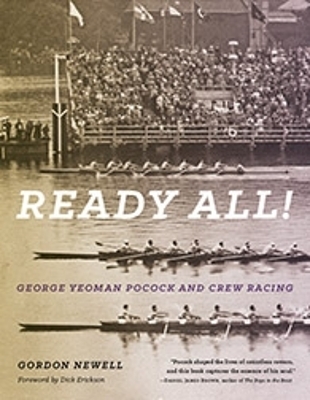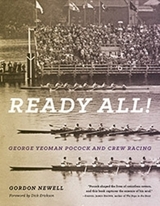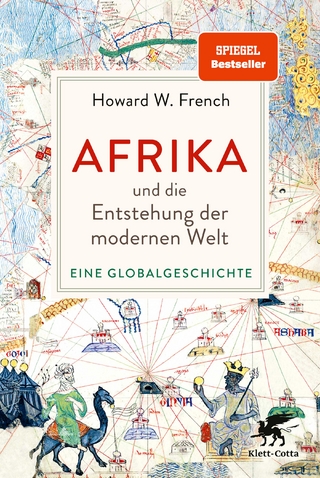
Ready All! George Yeoman Pocock and Crew Racing
Seiten
1987
University of Washington Press (Verlag)
978-0-295-96473-7 (ISBN)
University of Washington Press (Verlag)
978-0-295-96473-7 (ISBN)
- Titel erscheint in neuer Auflage
- Artikel merken
Zu diesem Artikel existiert eine Nachauflage
In the 1920s, an upstart West Coast college began to challenge the Eastern universities in the ancient sport of crew racing. Sportswriters scoffed at the “crude western boats” and their crews. But for the next forty years, the University of Washington dominated rowing around the world.
The secret of the Huskies’ success was George Pocock, a soft-spoken English immigrant raised on the banks of the Thames. Pocock combined perfectionism with innovation to make the lightest, best-balanced, fastest shells the world had ever seen. After studying the magnificent canoes built by Northwest Indians, he broke with tradition and began to make shells of native cedar.
Pocock, who had been a champion sculler in his youth, never credited his boats for the accomplishments of a crew. He wanted every rower to share his vision of discipline and teamwork. As rowers from the University of Washington went on to become coaches at major universities across the country, Pocock’s philosophy—and his shells—became nationally famous in the world of crew.
Drawing on documents provided by Pocock’s family, photographs from the University of Washington Crew Archives, and interviews with rowers who revered the man, Newell evokes the times as well as the life of this unique figure in American sport.
The secret of the Huskies’ success was George Pocock, a soft-spoken English immigrant raised on the banks of the Thames. Pocock combined perfectionism with innovation to make the lightest, best-balanced, fastest shells the world had ever seen. After studying the magnificent canoes built by Northwest Indians, he broke with tradition and began to make shells of native cedar.
Pocock, who had been a champion sculler in his youth, never credited his boats for the accomplishments of a crew. He wanted every rower to share his vision of discipline and teamwork. As rowers from the University of Washington went on to become coaches at major universities across the country, Pocock’s philosophy—and his shells—became nationally famous in the world of crew.
Drawing on documents provided by Pocock’s family, photographs from the University of Washington Crew Archives, and interviews with rowers who revered the man, Newell evokes the times as well as the life of this unique figure in American sport.
The late Gordon Newell was the author of several books on maritime history, including Pacific Tugboats and Mighty Mo, The U.S.S. Missouri: A Biography of the Last Battleship. The late Dick Erickson was University of Washington varsity crew coach from 1968 to 1987.
Foreword by Dick Erickson
Preface
1. Apprentice Watermen on the Thames
2. Making Do on the Pacific Northwest Frontier
3. Building Shells in the Tokyo Tea Room
4. Building Airplanes at the Red Barn
5. “Clumsily Built Western Boats”
6. “Eight Hearts Must Beat As One”
7. “There Are No Fast Boats, Only Fast Crews”
8. Olympic Gold
9. Races ‘round the World
10. Remembered Crews and Coaches
11. The Later Years
Appendixes
Bibliography
Index
| Vorwort | Dick Erickson |
|---|---|
| Zusatzinfo | 68 b&w illus. |
| Verlagsort | Seattle |
| Sprache | englisch |
| Maße | 216 x 279 mm |
| Gewicht | 907 g |
| Themenwelt | Sachbuch/Ratgeber ► Geschichte / Politik ► Regional- / Landesgeschichte |
| Sachbuch/Ratgeber ► Sport ► Segeln / Tauchen / Wassersport | |
| Geisteswissenschaften ► Geschichte ► Regional- / Ländergeschichte | |
| ISBN-10 | 0-295-96473-1 / 0295964731 |
| ISBN-13 | 978-0-295-96473-7 / 9780295964737 |
| Zustand | Neuware |
| Haben Sie eine Frage zum Produkt? |
Mehr entdecken
aus dem Bereich
aus dem Bereich
von der osmanischen Eroberung bis zur Gründung des Staates Israel
Buch | Softcover (2023)
C.H.Beck (Verlag)
18,95 €
Russen und Ukrainer vom Mittelalter bis zur Gegenwart
Buch | Softcover (2023)
C.H.Beck (Verlag)
18,00 €
eine Globalgeschichte
Buch | Hardcover (2023)
Klett-Cotta (Verlag)
35,00 €



